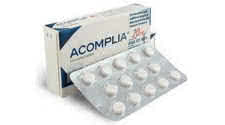New Acomplia Study: Acomplia Causes Small Weight Loss

WebMD, Oct. 17 2006 & Lancet, in press; published online Oct. 27, 2006
Acomplia (rimonabant) is a weight-loss drug produced by the French pharmaceutical giant Sanofiaventis. It works by blocking pleasure-sensitive receptors in the brain linked to compulsive behaviors such as cigarette smoking and overeating. It's sold in Europe, but so far the US.
Food and Drug Administration (FDA) declined to approve it because of side effects such as depression and anxiety. Clinical trails showed the drug caused modest, but sustained, weight loss, reduced waist circumference and an improved blood lipid (fats) profile.
Brazilian researchers, in a study of 6,600 overweight and obese adults who followed calorie-reduced diets, showed that low doses of the drug (5 milligrams per day) caused an average weight loss of 3 pounds in one year Higher doses (20 milligrams per day) caused more weight loss
(11 pounds) and reduced blood pressure and cholesterol, but produced psychiatric, neural and digestive system side effects. Predicted annual sales for Acomplia are $3.5 billion if the FDA releases it for sale in the United States.
Approved weight-loss drugs (Xenical and Meridia) haven't met sales expectations because of side affects and limited effectiveness.
Acomplia, the new anti-obesity drug approved in Europe, but not in the United States, is effective for preventing and treating type 2 diabetes, Researchers from Belgium studying obese, type 2 diabetics showed that Acomplia (20 milligrams per day) caused modest weight loss in one
year and reduced the symptoms of diabetes (decreased abdominal fat and hemoglobin A, a measure of excess sugar load).
Obesity and diabetes are significant risk factors for heart disease, stroke and some types of cancer. Acomplia caused modest, but sustained, weight loss, improved blood sugar regulation and blood fats and reduced waist circumference. The FDA rejected releasing the drug for sale
in early 2006 because of unacceptably higher rates of adverse events, such as depression and anxiety.